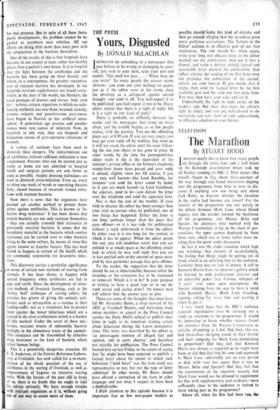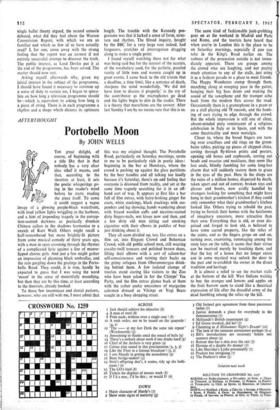The Marathon
TELEVISION
By STUART HOOD
'T SHOULD dearly like to know how many people sat through the entire four and a half hours on the Kennedy assassination which took up all Sunday evening on BBC 2. How many—like myself—began to flag about three-quarters of the way through and found themselves dipping into the programme from time to time to dis- cover if anything new was being said about Jack Ruby, to discover whether the situation in the studio had become any tenser? For the interest of the programme was not merely in the debate between Mark Lane, whose filmed inquiry into the murder formed the backbone of the programme, and Messrs. Belin and Specter, the attorneys who worked with the Warren Commission; it lay in the clash of per- sonalities, the open animus displayed by these three men, which was at times rather more ex- citing than the point under discussion.
In fact it was the studio situation which kept one watching—that element of incalculability, the feeling that things might be getting out of hand, which is an unfailing lure to the audience. Certainly there was no lack of drama. A call to Kenneth Harris from the director's gallery which he listened to with professional stoicism and an admirable poker face. Curious whispers of 'I can't' over some open microphone. Mr Specter slipping from his seat to have a word with Kenneth Farris. Mark Lane brooding, arguing, asking for more time and wasting it when he got it.
I very much hope that the BBC's audience research organisation may be carrying out a study on reactions to the programme. It would be interesting to know whether viewers found the attorneys from the Warren Commission as initially off-putting' as I did. Did they, like me, find themselves swinging round in their favour and their sympathy for Mark Lane diminishing in proportion? Did they feel that Kenneth Harris was always as impartial as he might have been, or did they feel that his tone and approach to Mark Lane—admittedly not an easy person to deal with—was less suave than it was to Messrs. Belin and Specter? Did they feel that the conventions of the situation—namely that Mark Lane would not be allowed to supplement his film with supplementary oral evidence—were sufficiently clear to the audience or indeed to those taking part in the programme? Above all, when the film had been run. the
single bullet theory argued, the second assassin debated, what did they feel about the Warren Commission Report, with which we are so familiar and which so few of us have actually read? I, for one, came away with the strong feeling that the report was an earnest if not entirely successful attempt to discover the truth. The public interest, as Lord Devlin put it at the end of the programme, has been served. The matter should now rest.
Asking myself afterwards Why, given my initial interest in the subject of the programme, I should have found it necessary to summon up a sense of duty to sustain me, I began to specu- late on how long a television programme should be—which is equivalent to asking how long is a piece of string. There is in each programme a rhythm and a shape which dictates its optimum length. The trouble with the Kennedy pro- gramme was that it lacked a sense of form, struc- ture and rhythm. The filmed inquiry, },'ought by the BBC for a very large sum indeed, had longueurs, stretches of interrogation dragging along to make a single point.
I found myself watching them not for what was being said but for the interest of the accents, of the vocabulary used, for the pathetic, puzzled vanity of little men and women caught up in great events. I came back to the old truism that a deadline, a time limit, like a sentence of death, sharpens the mind wonderfully. 'We did not have time to discuss it properly,' is the cry of the contributor as the microphones go dead and the lights begin to dim in the studio. There is a theory that marathons are the answer. After last Sunday I am by no means sure that this is so.































 Previous page
Previous page